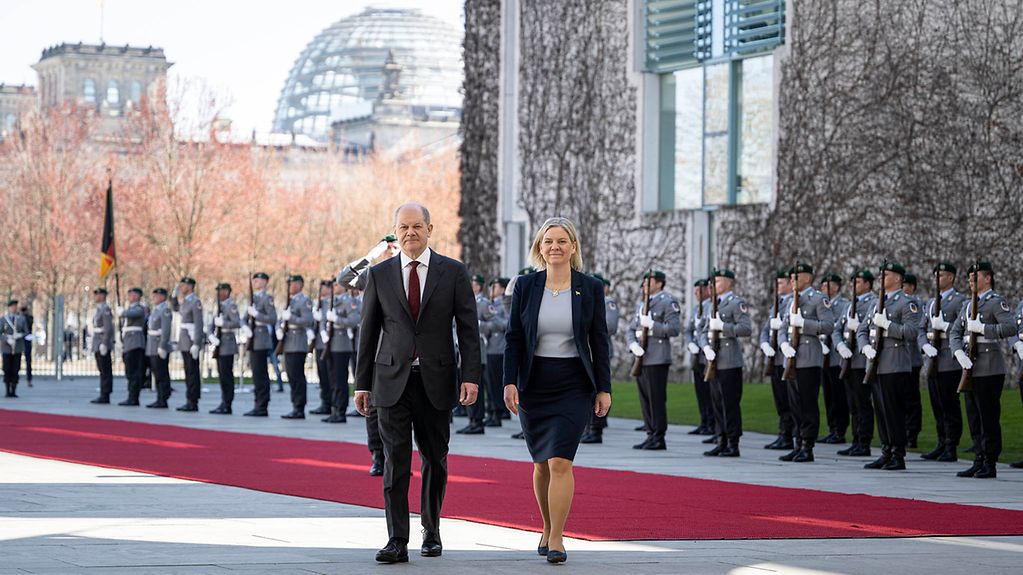Sweden’s Prime Minister in Berlin
“We cannot and will not get used to this state of war,” said the Federal Chancellor during his meeting with Swedish Prime Minister Andersson in Berlin on Monday. Europe had to step up its defence capabilities, said Scholz, adding that Russian president Putin should finally agree on a ceasefire and consent to serious negotiations.
4 min reading time

Federal Chancellor Scholz stressed the unity of the European partners at the inaugural visit of Swedish Prime Minister Andersson.
Photo: Bundesregierung/Bergmann
“The war is in its fifth week. The killings, the destruction, the suffering in Ukraine are continuing unabated. On our continent, less than two hours away from Berlin by air.
This is incomprehensible,” said Federal Chancellor Scholz at a joint press briefing with Sweden’s prime minister Magdalena Andersson in the Chancellery in Berlin on Monday.
He added: “I am choosing my words very deliberately in order to make it clear: we cannot and will not get used to this state of war.”
“The killing must end”
The Federal Chancellor described the Russian attack on Ukraine as a “blatant breach of international law – which we will not accept”. He appealed to President Putin once again to “finally agree on a ceasefire and consent to serious negotiations with Ukraine”.
Federal Chancellor Scholz said unequivocally: “Russian troops must withdraw from Ukraine. The killing must end.”
Turning point which has altered previous convictions
The attack marked a turning point which was clear to everyone, Scholz continued.
Russia’s aggression had led to Germany, like Sweden, changing the political position it had held for decades, with the result that Germany had supplied weapons and military resources to a war zone for the first time. The Federal Chancellor announced that aid would continue: “We are supporting Ukraine with financial, humanitarian and also military resources. And we will continue this support to the same extent.”
Refugees “will find shelter with us”
Regarding the situation in Ukraine, Federal Chancellor Scholz spoke of a “horrific situation”. Millions of people, including many women, children and the elderly, were fleeing – within the country and beyond it. Scholz stressed that more than two million refugees had found shelter in Ukraine’s neighbouring country Poland alone.
There were now more than 300,000 Ukrainians in the Federal Republic as well, he said.
“The longer the war lasts, the more citizens will seek refuge with us. And they will find this refuge here,” said Scholz.
Hearts opened to Ukraine
Europe had closed ranks in the phase after the Russian invasion began; the Federal Chancellor acknowledged this and spoke of “historic solidarity” in the EU. All EU tates had agreed to accept war refugees quickly and straightforwardly.
Federal Chancellor Scholz addressed the many voluntary helpers who had been involved in refugee aid in Germany for weeks, saying: “They have opened their hearts to the Ukrainians and also their flats and houses. This is a fantastic and moving sign of European solidarity.”
“Europe must step up its defence capabilities”
The turning point marked by the war also meant that Europe had to step up its defence capabilities, Scholz continued. Germany had already decided to significantly enhance the Federal Armed Forces, he said. Many further countries had made a similar announcement last week at the NATO Summit.
It was also important to make Europe independent of Russian energy supplies as quickly as possible. Germany, too, must reduce its dependency on Russian gas, oil and coal, Scholz continued. “We are intensifying our efforts to diversify our energy supply sources”, stressed Federal Chancellor Scholz.
Tackling institutional EU reforms
Regarding EU expansion policy, the governments of Sweden and Germany were convinced that it was time to open up entry negotiations with Albania and Northern Macedonia as soon as possible. “Any further delay makes the Western Balkans more vulnerable to the influence of third parties”, the Federal Chancellor warned.
Institutional reforms in the EU were necessary in order to increase its capacity for expansion, he said.
Climate neutrality as a goal
According to Scholz, the current crisis highlighted the importance and rightness of accelerating the planned energy transition. “By expanding renewable energies, we protect the climate and protect ourselves. Our goal of achieving climate neutrality in Germany by 2045 is more important than ever,” said the Federal Chancellor, adding that Germany and Sweden were united in their ambition to adopt the Fit For 55 climate package quickly.
Scholz announced an even stronger cooperation between the two countries regarding energy policy.
Danger of a famine disaster: Germany will provide a further 430 million euros
In order to prevent a global famine disaster in view of drastically increased food prices as a result of the war, the Federal Government will provide a further 430 million euros this year. Scholz announced that the majority of this would go to the United Nations World Food Programme.
Magdalena Andersson made her inaugural visit to Federal Chancellor Scholz and was received with military honours in the Chancellery. Andersson, 55, has been Leader of the Government since November 2021. She is the first woman to be Prime Minister of the Kingdom of Sweden.